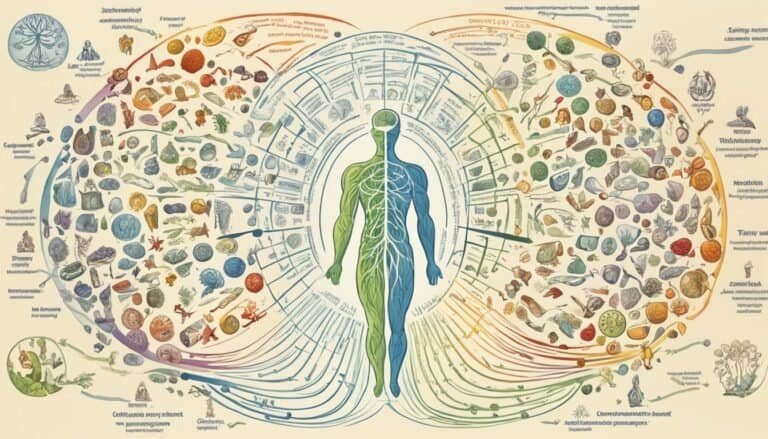Boost Your Confidence in Decision Making – Tips
“In the end, we only regret the chances we didn’t take.”
If making decisions is tough for you, you’re in good company. Many folks worry and pause before choosing. But think about a life where you’re sure of your choices, make them boldly, and welcome success. Getting better at decision making is key for growing personally and professionally.
This article has practical tips to better your decision-making skills. It also helps build the courage to choose well. Whether it’s about facing fears, matching decisions to goals, or listening to advice but trusting your gut, we’ve got strategies for you. Are you ready to take charge and become a decisive person?
Key Takeaways:
- Recognize that fear is a normal part of the decision-making process.
- Understand your desires and align your decisions with your long-term goals.
- Seek guidance and advice, but ultimately trust your own decision-making abilities.
- Stand up to your fears and view decision-making as an opportunity for growth.
- Set a time limit to avoid indecisiveness and encourage efficiency.
What is Confident Decision-Making?
Confident decision-making means being sure of your choices. It helps lower stress and anxiety. It’s vital in work and life to feel sure about your decisions.
Having decision-making confidence lets you handle situations well. You trust your judgment and make good choices. This confidence comes from trusting your ability to pick the best option.
Building this confidence eases stress related to making choices. Decision-making can feel tough and uncertain. But with confidence, you handle it better, making the process smoother.
Confident decision-making isn’t just for work; it’s for life too. At work, it leads to better outcomes and success. In life, it lets you make choices that feel right, making life more rewarding.
“Confident decision-making is the key to unlocking your full potential and achieving success in all areas of life.” – [Author]
To grow this kind of confidence, develop skills for better decisions. Next, we’ll look at ways to boost your decision-making confidence for better results.
Recognize That Fear is Normal
Feeling fear when making decisions is normal, especially big ones. Overcoming fear is a crucial step towards achieving success. This fear can make us unsure. But it’s key to not let it stop us from deciding confidently.
Fear is something everyone has, but dealing with it is what counts. It’s part of making choices. Knowing this helps you manage fear better.
To beat fear, face it. Ask yourself why you’re scared. Is it fear of failure or worry about others’ opinions? Knowing why helps you tackle it.
“Fear is the brain’s way of saying that there is something important for you to overcome.”
Use fear as a push to do more. Deciding despite fear takes you out of your comfort zone. Confidence is not the absence of fear, but rather the courageousness to act despite it.
Confident choices still come with fear. It’s about moving forward anyway. Confidence and fear can coexist as you navigate the decision-making process.
Acknowledge fear is universal. Let it motivate you to make brave choices. Each decision builds your confidence and brings you closer to your goals.
Recognize Your Desires
Understanding your desires helps you make confident decisions. It means knowing what you really want in life. You should think about your future and if your choices match that dream.
When your decisions match your true desires, they often lead you the right way. Stay true to yourself and think about your dreams. This way, you can make choices with a clear focus on what you want for your future.
Seek Guidance, But Trust Your Own Decision
In the process of making decisions, getting advice from others is really helpful. Listening to various viewpoints offers great insights. But it’s key to know the final choice is yours.
“Opinions given by others may serve as guideposts along your path, but it is your intuition that knows your heart’s true desires.”
Having faith in your own decisions boosts confidence. While advice is helpful, don’t give away your power to choose. Remember, you know your life best, thanks to your unique experiences and gut feelings.
When looking for advice, the final call is still yours. Listen to others but trust yourself to make the best decision. Think about how each option fits with your goals and values.
It can be tough to trust your gut, especially with hard choices. It means trusting yourself and believing in your instincts. Your intuition is a special skill, honed over time through experiences.
“When you trust your intuition, you empower yourself to make decisions aligned with your true self.”
Following your gut helps with uncertainty and doubt. It leads you to choices that reflect what you really want. While advice is good, always remember the strength of your own intuition in your journey.
When getting advice, make sure not to lose your decision-making ability. You have the power to choose. Trust in yourself, value your instincts, and walk the path that feels right for you.
Stand Up to Your Fears
Don’t let fear control how you make decisions. It’s okay to feel scared when you have to make big choices. But, remember, fear shouldn’t stop you from deciding confidently. Overcoming fears is key to facing fear in decision making and building confidence.
Think of making decisions as a chance to grow. Making mistakes is okay because they teach us a lot. By facing your fears and deciding despite them, you grow personally and professionally.
“Courage is not the absence of fear, but the triumph over it.” – Nelson Mandela
Like Nelson Mandela said, overcoming fears means winning over them, not removing them entirely. It’s about knowing your fears but not letting them control you. When you face your fears and still make decisions, you grow stronger and more confident in decision making.
It’s fine if every decision has some uncertainty. Accept the unknown and trust yourself to get through it. Standing up to your fears boosts your confidence and decision-making skills.
Set a Time Limit
Managing your time well is key to better decision making. Being indecisive leads to overthinking and stress. This stress can stop you from making confident choices.
Setting a time limit helps avoid indecision. By giving yourself a deadline, you encourage quicker decision-making. This creates urgency.
“Time management is the secret to unlocking your decision-making potential. By giving yourself a deadline, you force your mind to focus on the task at hand and make a decision within a reasonable timeframe.” – Kayla Thompson, renowned decision-making expert.
Setting a deadline provides a structure for making decisions. It helps stop procrastination and analysis paralysis. Still, it’s important not to rush too much.
Using time management tools like schedules or timers can boost your efficiency. Break the decision into smaller parts. This keeps you focused and organized.
Start by picking a realistic deadline, thinking about the decision’s complexity and urgency. Make sure you have enough time to gather info and evaluate options, but don’t drag it out too long.
Time is precious. By managing it well, you become a stronger decision-maker. Time management helps you break free from indecision.
Image:
List the Pros and Cons
When making tough choices, listing pros and cons is very helpful. This simple technique can really guide you.
Writing down the good and bad sides can offer valuable insights. It helps you understand what each choice might bring.
“Weighing the pros and cons allows you to weigh the potential benefits and drawbacks of each option, enabling you to make more informed and confident decisions.”
This method helps you organize your thoughts. You see the bigger picture more clearly.
By carefully thinking about the good and bad, you make clearer choices. Such choices reflect your goals and what you value.
Writing your thoughts down lets you see different viewpoints. It helps in deeply thinking things through. So, you don’t miss important factors.
It’s not just about counting pros and cons. It’s about understanding their importance in your decisions.
This approach gives you a structured, balanced way of making choices. It helps you avoid missing important details or being influenced by just your feelings.
Next time you face a hard choice, try writing a list of pros and cons. This simple step can help you make a well-thought-out decision.
Pros and Cons List Example:
Decision: Should I pursue higher education?
- Pros:
- Opportunity for advanced knowledge and skills
- Better career prospects and earning potential
- Personal growth and self-improvement
- Cons:
- Financial investment required
- Time commitment for studying
- Potential competition in the job market
By looking at the pros and cons, you can decide well. This decision will match your aims and values, leading to success.
Trust Yourself
Trusting yourself is important when choosing confidently. Self-trust builds the base for good choices. It helps you handle your own unique situations. Gathering information and looking at different views helps a lot. But in the end, trust your judgment and pick what’s best for you.
Believing in yourself helps you make decisions strongly. It fights off self-doubt and lets you find joy in your choices. You have the knowledge to look at situations and make wise choices.
“Self-trust is the first secret of success.” – Ralph Waldo Emerson
Decision making can bring doubt or fear. But don’t let these feelings shake your trust in yourself. Accept that decision making can be tough. It’s all about growing. You can get through any challenge and become stronger.
Acknowledge Your Accomplishments
Think about your past wins to increase your self-trust. Remember when you made good choices and things went well. Know your strengths and let them guide you in making decisions in the future.
Embrace Imperfections
Trying to be perfect can hurt your self-trust and make deciding hard. Understand that it’s okay to make mistakes. See failure as a chance to grow and learn. Knowing mistakes are part of success lets you choose with more confidence.
- Believe in your abilities and potential.
- Listen to your intuition and inner voice.
- Embrace uncertainty and take calculated risks.
- Surround yourself with positive influences and support.
By trusting in yourself, you lay a solid ground for confident choices. Remember, the power to make good choices lies within you. You can achieve both personal and professional success.
Just Do It!
When making decisions, taking action is crucial. Overthinking and hoping for the “perfect” decision can cause analysis paralysis. This means you get stuck, unable to make a choice.
Instead, trust your ability to make good decisions. Even if they seem risky, it’s better than not choosing at all.
Waiting too long can mean missing out. Procrastination stops you from achieving your best. Embrace a “just do it” mindset. Take the first step now.
Overcoming analysis paralysis means acting and not overthinking. Trust your decision-making. Believe in your power to adapt and correct your path if needed.
“The only way to beat analysis paralysis is by taking action. It’s okay if a decision isn’t perfect. What’s important is moving forward and learning.”
Taking action lets you grow and learn. Even if things don’t go as planned, you’ll gain insights. These insights help you make better decisions in the future.
No decision is set in stone. If something doesn’t work, be ready to change direction. The key is to keep moving forward towards your goals.
Embrace the Power of Decision Making and Action
Decisions drive progress and growth. By making choices and acting, you shape your future. Don’t let the fear of a wrong choice stop you.
- Take small steps: Simplify your decisions into easy tasks. Take small steps towards each.
- Learn from failures: Mistakes are chances to learn and get better. Welcome them as growth opportunities.
- Seek support: Find friends, mentors, or professionals who encourage and guide you.
Confidence in decision-making grows with practice. The more you act decisively, the better you get. Trust yourself, move past overthinking, and go forward with confidence.
Decision Making Confidence Starts Today
Building confidence in decision-making is a step-by-step journey. It doesn’t happen suddenly. It develops with regular effort and looking inward. By taking small steps and focusing on your decisions, you can slowly gain the confidence to choose wisely.
Practice Makes Perfect
Decision making gets better with practice, just like any other skill. The more you decide, the more confident you feel. Pay attention to your daily decisions, no matter how minor. Think about their outcomes and learn from both mistakes and wins.
As time passes, you’ll understand your decision-making process better. This hands-on experience will boost your confidence.
Embrace Self-Confidence
Having faith in yourself is vital in decision making. Know that you can make good decisions and trust your judgment. Confidence means trusting your abilities and being true to yourself. It’s not about always being right. Celebrate your strengths and learn from areas of improvement.
This belief in yourself is essential for making wise choices.
“The greatest power you possess in decision making is the belief that you can make a difference.” – Unknown
Overcome Doubts with Action
Doubts and fears are normal in decision making, but action is key. Don’t let fear stop you. Believe in your ability to face challenges. The only way to see the result of a decision is to go for it and see what happens.
Continued Growth
Gaining confidence in decision-making never stops. As you keep practicing, learning, and growing, your confidence builds. Have people around who support your ability to make great choices. Look for mentors or role models who push you to do your best.
The more you work on yourself and your decision-making skills, the more confident you’ll get.
Conclusion
Developing confidence in making decisions is key for growth. Use the tips in this article to improve your skills. Being confident helps you make better choices.
Make decisions that suit your wants and goals. Trust yourself and your ability to choose wisely. Action is important. Don’t get stuck overthinking.
Using these strategies will boost your confidence in decision-making. Don’t let fear stop you. Trust your gut, take steps forward, and make decisions that shape a great life and career.






